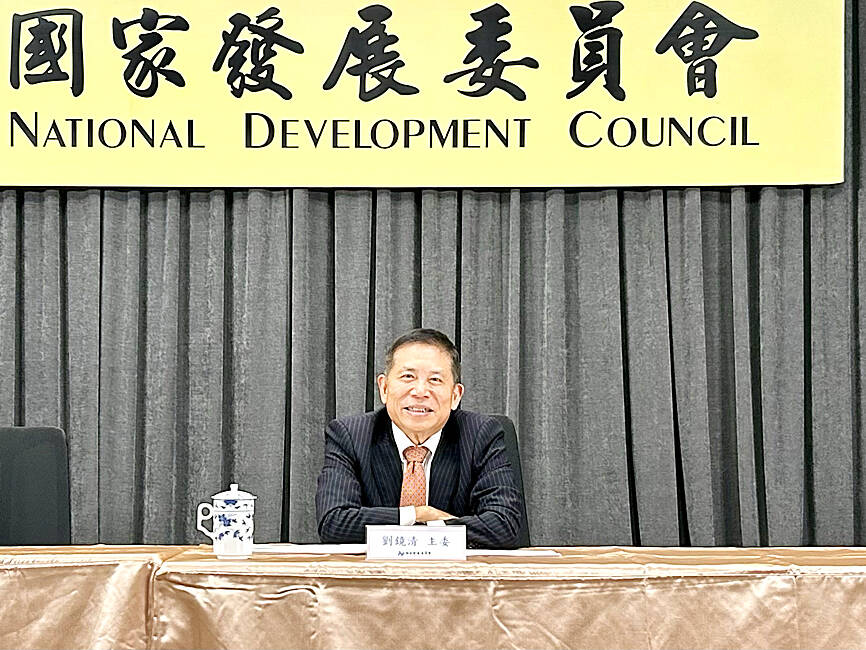The National Development Council (NDC) yesterday unveiled its four-year economic development plan, which aims to achieve GDP growth of between 2.8 percent and 3.6 percent, and increase GDP per capita from US$39,105 to US$42,787.
NDC Minister Paul Liu (劉鏡清) unveiled the policy goal at a news conference in Taipei after the Cabinet gave its approval.
“The projected economic growth during 2025 to 2028 is doable and pragmatic, as it falls within the 10-year average,” Liu said.

Photo: Wu Hsin-tien, Taipei Times
Taiwan’s economy is expected to grow 3.9 percent this year, the second-highest in 10 years, thanks to a rush by US technology giants to develop artificial intelligence (AI) services and applications, he said.
Taiwan is home to the world’s major suppliers of AI chips and servers.
Private investment, a growth drag in recent years, could exceed NT$5 trillion (US$154.79 billion) this year for the second time on record and the momentum would continue into next year, given strong imports of capital equipment and input materials, Liu said.
At the same time, the government would lend support by pouring money into infrastructure projects and the development of green energy sources, making the 3.9 percent GDP growth plan achievable and practical, the minister said.
If things proceed smoothly, Taiwan would overtake Japan in terms of GDP per capita this year, South Korea next year and catch up with Israel in the future, Liu said.
Additionally, the council aims to achieve unemployment rates of between 3.2 percent and 3.5 percent in the coming four years, with the core consumer price index (CPI) expected to be below the central bank’s 2 percent target, he said.
Core CPI is a more reliable long-term price tracker because it excludes volatile items including vegetables and oil products, has returned to the 2 percent territory for four consecutive months, versus an average headline CPI of 2.3 percent in the first seven months of this year, government data showed.
Liu said he is upbeat that GDP per capita would surpass US$40,000 in 2027 and headline GDP would approach US$1 trillion in 2028.
That would be helped by Taiwan’s semiconductor leadership positions that make the industry indispensable in global technology supply chains, he said.
Against this backdrop, AI production value could reach NT$1 trillion in 2026, while satellite communications could generate NT$30 billion and military drones yield another NT$30 billion, the minister said.
NDC Deputy Minister Kao Shien-quey (高仙桂) said the government has observed an imbalanced development between the semiconductor industry and other sectors and it is working to create a more sustainable balance by placing more emphasis on social investment.

Application-specific integrated circuit designer Faraday Technology Corp (智原) yesterday said that although revenue this quarter would decline 30 percent from last quarter, it retained its full-year forecast of revenue growth of 100 percent. The company attributed the quarterly drop to a slowdown in customers’ production of chips using Faraday’s advanced packaging technology. The company is still confident about its revenue growth this year, given its strong “design-win” — or the projects it won to help customers design their chips, Faraday president Steve Wang (王國雍) told an online earnings conference. “The design-win this year is better than we expected. We believe we will win

Intel Corp chief executive officer Lip-Bu Tan (陳立武) is expected to meet with Taiwanese suppliers next month in conjunction with the opening of the Computex Taipei trade show, supply chain sources said on Monday. The visit, the first for Tan to Taiwan since assuming his new post last month, would be aimed at enhancing Intel’s ties with suppliers in Taiwan as he attempts to help turn around the struggling US chipmaker, the sources said. Tan is to hold a banquet to celebrate Intel’s 40-year presence in Taiwan before Computex opens on May 20 and invite dozens of Taiwanese suppliers to exchange views

Chizuko Kimura has become the first female sushi chef in the world to win a Michelin star, fulfilling a promise she made to her dying husband to continue his legacy. The 54-year-old Japanese chef regained the Michelin star her late husband, Shunei Kimura, won three years ago for their Sushi Shunei restaurant in Paris. For Shunei Kimura, the star was a dream come true. However, the joy was short-lived. He died from cancer just three months later in June 2022. He was 65. The following year, the restaurant in the heart of Montmartre lost its star rating. Chizuko Kimura insisted that the new star is still down

While China’s leaders use their economic and political might to fight US President Donald Trump’s trade war “to the end,” its army of social media soldiers are embarking on a more humorous campaign online. Trump’s tariff blitz has seen Washington and Beijing impose eye-watering duties on imports from the other, fanning a standoff between the economic superpowers that has sparked global recession fears and sent markets into a tailspin. Trump says his policy is a response to years of being “ripped off” by other countries and aims to bring manufacturing to the US, forcing companies to employ US workers. However, China’s online warriors